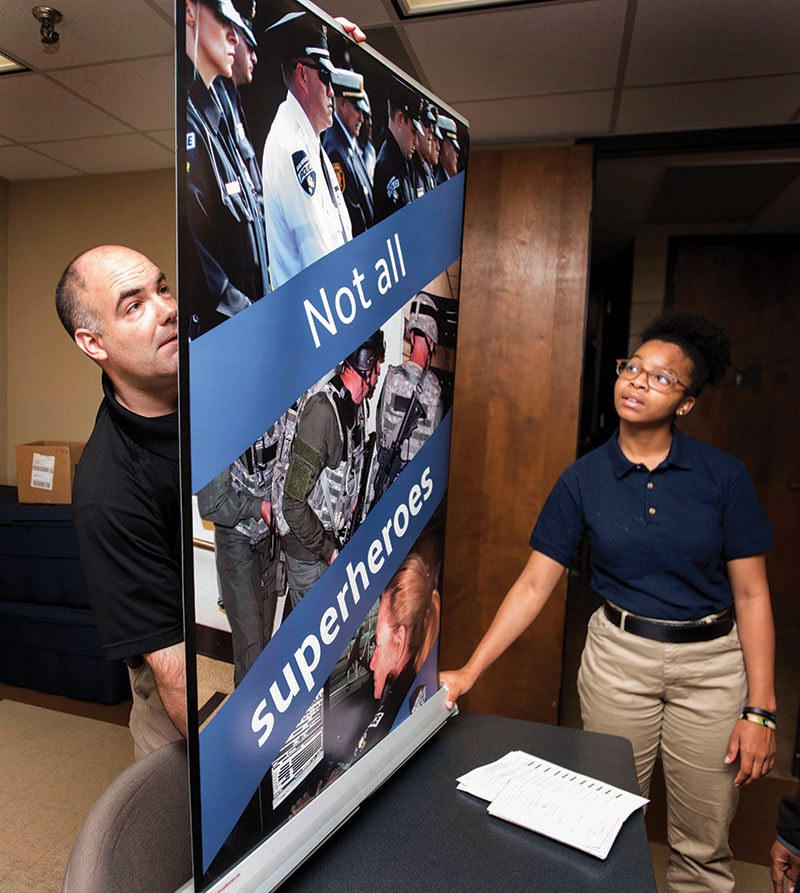Salisbury Police hiring new officers, coming out of shortages
Published 12:10 am Sunday, March 12, 2017

- JON C. LAKEY / SALISBURY POST Sgt. J.T. Crews (left) and new police recruit S.M. Taylor (right) with a banner that is used during recruitment programs. Taylor is a new recruit to the Salisbury Police Department that is almost completed with her Basic Law Enforcement Training. While on spring break she has been spending all her time at the Salisbury Police Department getting familiar with the office personal, surroundings and her soon to be fellow officers. Sgt. Crews takes the banner and some other items to display when recruiting at job fairs at colleges that have Criminal justice programs. Thursday, March 9, 2017, in Salisbury, N.C.
By Shavonne Walker
shavonne.walker@salisburypost.com
SALISBURY — Small departments in North Carolina was the search criteria that S.M. Taylor used to find the Salisbury Police Department. The Detroit native and recent Johnson C. Smith University grad was looking for a law enforcement agency to plant her feet.
Taylor hopes to have a successful and healthy career in law enforcement at the Salisbury Police Department.
She is one of five people who’ve been offered employment with the Salisbury Police Department, bringing the number of current vacancies to 13.
Taylor is seven weeks into 18 weeks of her Basic Law Enforcement Training (BLET) classes.
During class at Rowan-Cabarrus Community College, she’s learned the fundamentals of arresting someone and defensive tactics that can be used to subdue a violent subject. There’s been lots of book work and other basic principles to learn.
When she first arrived, Taylor said she “noticed a lot of people were (like) family.”
She chose the police department because she liked the close-knit camaraderie of the department and because she wanted to be able to gain the experience that a smaller department could offer.
She admits her father wasn’t keen on her going into law enforcement because of the potential dangers, but her mother supports her decision for the profession.
“My dad wants me to be a nurse,” Taylor said laughing.
She obtained a degree in criminology and hopes to pursue a career as an investigator.
She’ll complete Basic Law Enforcement Training in June and will eventually ride along with a field training officer and then move onto solo enforcement.
The numbers
Salisbury Police began this year with 18 vacancies and have brought that number down to 13 with the recent hiring of five officers.
“We are in the process of picking up a couple more in the very near future,” said Police Chief Jerry Stokes.
Stokes said by April he expects the department’s newly hired positions to be close to 10 and to have only eight vacancies of the authorized 81 positions by the end of the year.
But, he added that between July 1 and June 30, 2018, there are five people who intend to retire.
Stokes’ goal was to be at 90 percent of the authorized 81 officers by the end of the year, but he said that goal could be reached in as little as three months.
He said he’s very pleasantly surprised at how well the department has chipped away at its goal and has worked toward filling vacancies.
Officials with neighboring police departments say they aren’t experiencing a large number of vacancies, but they are not at 100 percent staff.
Kannapolis Police Chief Woody Chavis said his department has three vacancies out of 88 allotted sworn positions, while Concord Police Chief Gary Gacek said his department has grown by 21 officer positions in the last year and a half.
“The combination of that growth and normal turnover have contributed to a number of vacancies. Right now, we have about eight vacancies out of the 183 sworn positions budgeted for,” Gacek said.
One new officer will begin with the Statesville Police on Monday, department officials said, bringing the department vacancies to eight out of 83 sworn officers.
Why the shortage
It’s a dangerous job, say some police chiefs, and the reality is some people don’t want to work in such a dangerous profession. Between January 2016 and December 2016, there were 144 officers killed nationwide in the line of duty, a 9 percent increase from the previous year, according to a report from The National Law Enforcement Officers Memorial Fund.
In 2015, according to the most available statistics collected by the FBI, 50,212 officers were assaulted while performing their duties.
“Cops are asked to do a difficult job,” Chief Stokes said.
Over the last several years, law enforcement officers nationwide have been criticized in the wake of highly publicized incidences of police-involved shootings and other accusations of abusive police behavior, making the pursuit of a law enforcement career a difficult decision.
“It’s a dangerous profession,” Stokes said, and “it’s very difficult for people to see the benefit of coming into a career that is scrutinized.”
Over the last three years, the number of students enrolled in Basic Law Enforcement Training statewide has decreased by 57 percent. There were 2,713 people enrolled in 2013 and just three years later 1,156 people were enrolled, according to statistics provided by the Criminal Justice Education and Training Standards Commission, a division of the N.C. Department of Justice.
In 2013, of the 141 students scheduled for training, nine of those students canceled. According to statistics provided, in 2016 there were 66 students scheduled for training classes and 19 of them canceled.
In order to help with the shortages, Salisbury Police relied on a little help from off-duty officers with the Rowan County Sheriff’s Office. The deputies have taken on extra duty within the city and work at the direction of the city police supervisor on duty. The sheriff’s office has also assisted the police in a recent homicide investigation.
The help from the sheriff’s office allows the police department to work at a fuller staff, but the need for more police officers still exists.
Concord Chief Gary Gacek said some his department’s shortages are related to a “desire to relocate to another part of the state, to another state and even to another country.”
He said some officers want to get out of police work altogether.
Gacek said he believes it has become harder to recruit people to the profession “because of the sometimes unfair negative attention that has been placed upon the profession. This is a problem across the country right now.”
He said his department is growing and there are many opportunities for advancement or specialization and those pursuing a career in law enforcement realize this as well.
“I continue to see a reasonably strong interest from officers or deputies from other parts of the state. We have been fortunate to have experienced law enforcement professionals seek employment with the Concord Police Department, which helps to keep our vacancies at a minimum during this difficult recruiting time in our profession’s history,” Gacek said.
Kannapolis Police Chief Woody Chavis said his department isn’t having a problem finding qualified applicants. He added that the hiring process is very stringent, including very comprehensive background checks.
“Our three vacancies are due to retirement and resignations, moving to other areas of law enforcement, and relocating to other areas,” he said.
Chavis said his department’s turnover rate varies from year to year based on the number of retirements.
He said the Kannapolis Police Department recruits at every opportunity, including job fairs, local colleges and social media.
“Our officers are one of our best recruiting tools. They see an individual who is thinking about a career in law enforcement and they suggest they do a ride-a-long and check our department out,” he said.
Recruitment
Stokes said his officers say they would rather work short staffed than have someone not qualified or capable of doing the job.
“We’re not just filling positions,” he said.
In late 2016, Sgt. T.J. Crews was appointed as the recruitment manager following the retirement of the previous manager, who was a civilian, and he began his duties in January.
The city of Salisbury also has a public safety recruiter, whose job is to recruit for potential police and fire employees. The city’s recruiter and Sgt. Crews work hand-in-hand to identify job fairs and colleges for future employees.
Stokes said while the city’s recruiter is more familiar with benefits and other human resources matters, the police recruiter can field law enforcement questions.
Crews regularly speak with criminal justice students at regional colleges to garner a good source of potential quality applicants as well as former military personnel and those already enrolled in local Basic Law Enforcement Training classes.
There isn’t much recruiting done of high school students since the required age for Basic Law Enforcement Training classes is 20, Crews said, but if high school students believe they want to pursue a law enforcement career he encourages them to become part of the police department’s Explorers or cadet program.
Crews’ other duties include administering the written hiring test, which tests basic grammar, math and other written skills.
The written test is administered the first Tuesday of each month at two different times — 9 a.m. and 6 p.m. Those who take and pass the test will move onto the next application phase, Crews said.
No appointment is necessary to take the test. All candidates have to do is show up, he said.
There were 14 people who recently took the test and one person failed. However, it’s not the end for that person, since they can return to take the test again at some point, he said.
Part of the hiring process includes an oral panel made up of a patrolman, supervisor, a human resources personnel and a citizen. Each person in the group asks the applicant one of eight or nine questions and based on satisfactory responses the applicant moves to the next phase. Applicants who complete the oral panel are scheduled for a polygraph and extensive background screening.
The background check includes conversations with previous employers, spouses, neighbors, relatives and friends as well as all references listed.
Potential applicants then meet with Chief Stokes and if selected, are extended a conditional offer of employment. An applicant must successfully pass drug, medical, audio and psychological screenings.
There are currently three students in Basic Law Enforcement Training classes, of which two will graduate in May and April.
Crews said there is also a plan to send potential officers to training classes in August. Those students will then graduate in December.
Before students can enroll in the training classes, they must first pass the North Carolina Diagnostic Assessment and Placement (NC DAP), which assesses students’ math, English and reading skills.
“We have not lowered our standards to get people in here. It’s not fair to the community and to us,” Crews said.
Anyone who would like to take the written test can show up at the Salisbury Police Department, 130 E. Liberty St., and for more information about how to become a police officer, contact Sgt. T.J. Crews at 704-638-5333.





